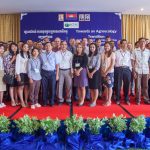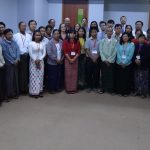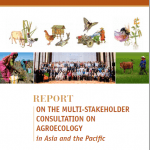29 downloads
Title of document: Organic Agriculture as an Opportunity for Sustainable agricultural Development Authors: Verena Seufert Ministry/Government Agency/Organisation: Institute for the Study of International Development Year of publication: 2012 Geographic focus: World wide Url original document: https://www.mcgill.ca/isid/files/isid/seufert.pb13.pdf Summary: We need drastic change in the global food system in order to achieve a more sustainable agriculture that feeds people adequately, contribute to rural development and provide livelihood to farmers without destroying the natural resource basis. Organic agriculture has been proposed as an important means for achieving this goals. Organic agriculture currently covers only a small area in developing countries but its extent is continuously growing as demand for organic products is increasing. Read More
2 downloads
Title of document: Lending credence: motivation, trust, and organic certification Authors: Steve Holland Ministry/Government Agency/Organisation: Holland Agricultural and Economics Year of publication: 2016 Geographic focus: Global Url original document: https://ideas.repec.org/p/ags/aaea15/205192.html Summary: Various forms of regulation are often used to improve the performance of markets when relevant information is lacking. A good example is markets for credence goods or goods with characteristics that are difficult or impossible for consumers to observe even after purchase and use. Read More
2 downloads
Title of document: Audit and agrarianism: the moral economy of an alternative food network Authors: Liz Carlisle Ministry/Government Agency/Organisation: Science of the Anthropocene Year of publication: 2015 Geographic focus: Global Url original document: elementascience.org Summary: With consumers and producers seeking alternative to corporate, industrial food, systems of provision that promise greater ecological and social sustainability have gained in popularity. As these Alternative Food Networks (AFNs) scale up and go mainstream, both scholars and the general public want to know who is holding them accountable to their purported goals. Read More
8 downloads
Title of document: The Farming Systems Trial Authors: Rodale Institute Ministry/Government Agency/Organisation: Rodale Institute Year of publication: Geographic focus: Global Url original document: www.rodaleinstitute.org Summary: The hallmark of a truly sustainable system is its ability to generate itself. When it comes to farming, the key to sustainable agriculture is healthy soil, since it is a foundation for present and future growth. Organic farming is far superior to conventional systems when it comes to building, maintaining and replenishing the health of soil. For soil health alone, organic agriculture is more sustainable than conventional. When one also considers yields, economic viability, energy usage, and human health, it is clear that organic farming is sustainable, while current conventional practices are not. Read More

29 downloads
Title of document: Consolidated account of the 4 national multi stakeholder workshops on agroecological transition in the Mekong Region Authors: Pierre Ferrand Ministry/Government Agency/Organisation: ALiSEA Year of publication: 2016 Geographic focus: Cambodia, Laos, Myanmar & Vietnam Summary: This report presents a short consolidated account of 4 national multi-stakeholder workshops addressing Agroecological Transition in the Mekong Region and bringing together 225 participants that have been organized between March and June 2016 (Myanmar, Cambodia, Vietnam Lao PDR). Such workshops aimed at sharing knowledge, information and actions between agricultural development stakeholders. Read More
21 downloads
Title of document: Organic Agriculture and Post 2015 Development Goals: building on the comparative advantage of poor farmers Authors: Sununtar Setboonsarng, Anil Markandya & al. Ministry/Government Agency/Organisation: ADB Year of publication: 2015 Geographic focus: South East Asia Url original document: http://www.adb.org/publications/organic-agriculture-and-post-2015-development-goals Summary: The book makes an evidence-based case for organic agriculture in developing countries, particularly those in Southeast Asia. It starts by examining the data from organic agriculture farms, comparing them with those from nonorganic agriculture farms to see what can be said about the effects of organic agriculture on the livelihoods of comparable people and in terms of the MDGs (Chapters 1, 8, and 9). The book then goes on to look at the economic dimension of promoting organic agriculture and actual experiences in implementing it. It explores the following questions: Are the benefits of such programs justified in terms of their costs (Chapter 2)? Does certification help farmers in terms of increased incomes for their products (Chapter 3)? How well has certification worked to increase incomes and livelihoods in particular cases (Chapter 4)? Which benefits motivate farmers to adopt organic agriculture (Chapter 5)? (This is important as a guide to which policies to use to promote the practice.) Is organic agriculture the best way to improve rural livelihoods, or can we do better through other interventions, such as promoting biofuels (Chapter 6)? What are the macroeconomic impacts of promoting organic agriculture (Chapter 7)? Following these chapters, the book looks at evidence on some of the big environmental questions related to sustainable agriculture. The first is its role in sequestering carbon, a major issue given the threats we face from climate change (Chapter 11). A second is enhancing biodiversity and preventing the loss of genetic material (Chapter 12). Finally, the book considers some of the big issues in the debate surrounding agriculture which touch on organic agriculture in developing countries. One deals with the environmental costs of shipping agricultural products over large distances (food miles, Chapter 13). Another is whether organic agriculture does indeed lower yields and thereby reduce our capacity to feed the growing population of the planet (Chapter 14). Read More
22 downloads
Title of document: Decision of the Minister of Agriculture and Forestry on Organic Agriculture Standards Authors: Ministry of Agriculture and Forestry Ministry/Government Agency/Organisation: Ministry of Agriculture and Forestry Year of publication: 2011 Geographic focus: Laos Url original document: http://faolex.fao.org/cgi-bin/faolex.exe?rec_id=141126&database=faolex&search_type=link&table=result&lang=eng&format_name=@ERALL Summary: This version of the Lao Organic Standards is a translation of the Lao Organic Standards, edited by a native English speaker and might not reflect all times the full and precise meaning of the Lao version. The Lao standards are developed on the basis of models developed by the International Federation of Organic Agriculture Movement (IFOAM) and Agriculture Certification Thailand (ACT). The present standards will undergo periodic revision in order to reflect changes in production and marketing and growing experience of Lao stakeholders in organic agriculture. Read More

28 downloads
Title of document: Proceedings of the national multi stakeholder workshop on Agroecology Transition, Cambodia Authors: Lucie Reynaud, Pierre Ferrand and Dr Saythong Vilayvong Ministry/Government Agency/Organization: ALiSEA Year of publication: 2016 Geographic focus: Cambodia This report presents the main findings of the discussions held during the 2 days workshop addressing the agroecology transition in Cambodia in Phnom Penh on the 30th and 31st of March 2016. Read More

29 downloads
Title of document: Proceedings of the national multi stakeholder workshop on Agroecology Transition, Myanmar Authors: Pierre Ferrand, Dr Htet Kyu and Lucie Reynaud Ministry/Government Agency/Organization: ALiSEA Year of publication: 2016 Geographic focus: Myanmar This report presents the main findings of the discussions held during the 2 days workshop addressing the agroecology transition in Myanmar in Yangon on the 7th and 8th of March 2016. Read More

11 downloads
Title of document: Report on the Multi-Stakeholder Consultation on Agroecology in Asia and the Pacific, FAO, Authors: FAO Ministry/Government Agency/Organization: FAO Year of publication: 2016 Geographic focus: Asia and the Pacific Seeking to gain a better understanding of the role that agroecology can play in eradicating hunger and malnutrition, FAO organized the International Symposium on agroecology for Food Security and Nutrition in September 2014 in Rome, Italy, followed by three regional meetings in Asia and the Pacific, sub-Saharan Africa and Latin America and the Caribbean. The Multistakeholder Consultation on agroecology for Asia and the Pacific was held in Bangkok, Thailand on 24-26 November 2015. FAO acted as a facilitator to enable debates and foster collaboration among a variety of actors in order to advance science, knowledge, public policies, programmes and experiences on agroecology, supporting the strengthening of the already-extensive evidence-based knowledge for agroecological approaches in agriculture. The participants in this meeting, representatives of governments, civil society, including peasants, fisherfolks, pastoralists, urban communities, indigenous peoples, women’s organizations, youth and others, academia, and private sector, issued recommendations for the development of agroecology in Asia and the Pacific after two days of discussion. Read More

 Asia & Mekong Region
Asia & Mekong Region  Cambodia
Cambodia  Laos
Laos  Myanmar
Myanmar  Other
Other  Vietnam
Vietnam